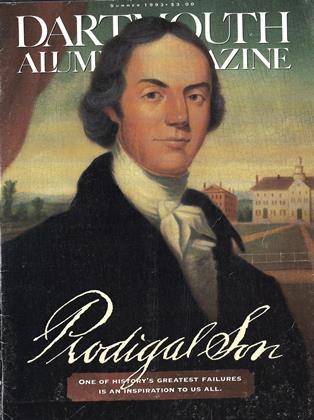Following the watery path of Ledyard, students and their elders canoe over a bed of enthusiastic alumni.
On a cool may morning, the pine-shaded Ledyard canoe club can be the chilliest place in Hanover. The prospect of starting from here on the annual seven-day Ledyard Trip to the Sea is just a bit dispiriting. Walker Weed '4O is nothing daunted, however. Self-described as "135 pounds of fighting gristle," he's been through this ritual seven times before. He and a warmly dressed companion are observing one of Dartmouth's very oldest annual traditions—if not its most consistently observed. No one thought to reprise John Ledyard's trip for almost 150 years. The river, in fact, was not used much at all during that time, except during the 1870s, when briefly there had been a crew. (That sport languished, however, after the boathouse collapsed in a snowstorm one winter.) In December of 1919 a group of three undergraduates sought financial support for a revived crew but ran afoul of the College's drive for funds to build Memorial Stadium. They settled instead for a more modest canoe club. A regular reenactment of Ledyard's voyage seemed natural to this group. In the spring of 1921, 13 students and a Fox Films cinematographer (the club has always had a gift for public relations) paddled five days and four nights and, after losing two canoes, tasted saltwater at Saybrook Point.
Seventeen men, 12 women (an unusual ratio; most years there are more women than men), and one faculty member have signed up for this year's trip. Sixteen brightly colored canoes fill the river from bank to bank. Things weren't always this civilized. The 1923 trip established a tradition of racing down the river against the clock. The ten men on that trip, though soaked by three days of rain, established a record of 89 hours. After 1925 the trip lost its annual status. The river was fouled with pollutants. Between 1935 and 1956 there were no spring downriver trips at all. In 1959 Robert Harvey '61 and William Berneking '61 beat the old record by almost ten hours, to 46:20. Sixteen other paddlers, following at a more sedate pace, were featured in a Life magazine article about the trip (the PR thing again). Since 1960, when Pete Knight '62 and Jon Fairbank '62 won a five-school race in an incredible 33 hours, 50 minutes, there have been no more serious attempts to beat the record. The 1992 flotilla has a much easier start just seven miles to a beefalo farm where the students play Frisbee, construct a dome shelter of criss-crossed canoes, and build an Indian sweat lodge with a huge blue plastic tarp.
The Connecticut River itself flows over a bed of ancient rock and ice-age sand and gravel. The Trip to the Sea flows largely over a bed of enthusiastic alumni. On the third day the group s breakfast is waiting at Turners Falls, where stalwarts of the Pioneer Valley Alumni Club wait with a load of groceries. On the day after that the boats bound through easy rapids and then head up the Farmington River to Jim's, a world-class pizzeria. The speaker's gage goes around the room. Walker Weed gives a rousing toast to life from Sean O'Casey. After breakfast in the Loomis-Chaffee School's dining hall, the flotilla is off downriver again. The first tailwind in days inspires everyone to tie all the canoes together and erect the big blue tarp as a sail. In little more than an hour the skyline of Hartford appears. Paddling through the city, the group initiates a new tradition, called Strip to the Sea—to the obvious delight of city workers.
Sunday morning, the last day, the sun breaks through fog onto beautiful homes along the banks. From a couple of decks, middle-aged men shout, "Hi, Dartmouth!" The canoes round the Old Saybrook lighthouse and head to the cove where Bill Webster '39 and the Southeast Connecticut Alumni Club prepare a final barbecue.
"This is probably the most intense week I've spent at Dartmouth in four years," says one sunburned senior woman, gazing out over Long Island Sound. "Plus, it's been a great chance to just get away, at the end of things, and think about where I am." Generations of Dartmouth paddlers doubtlessly concur, silently paraphrasing Sean O'Casey's toast:...to life and to the river all it had been, to what it was, to what it would be. Hurrah! Ms
A filthy river kept the seaivard paddle from being an annual tradition until the sixties. The speed record was set in 1962.
Forty students attempted the 1960 race. Only a dozen, led by Pete Knight '62 and Jon Fairbank '62, completed the 218 miles.
Builder, outdoorsman, raconteur and public-radio commentator, Will Lange is chief perpetual navigator of the Geriatric Adventure Society.
 View Full Issue
View Full Issue
More From This Issue
-
 Cover Story
Cover StoryThis Man Scanndalized Eleazar Wheelock
June 1993 By Jerold Wikoff -
 Feature
FeatureTHE PEMI AFFAIR
June 1993 By KIRK SIEGEL'82 -
 Feature
FeatureRescuing the Wisdom of Vanishing Tribes
June 1993 By Robert Eshman '82 -
 Feature
FeatureDoes a Bicycle Have a Soul?
June 1993 By Lee Michaelides -
 Article
ArticleDr. Wheelock's Journal
June 1993 By "E. Wheelock" -
 Article
ArticleMaking the Walls Talk
June 1993 By Karen Endicott
Features
-
 Feature
FeatureA TASTE FOR CHANGE
NOVEMBER 1963 -
 Cover Story
Cover StoryThe Cartoon Warrior
December 1991 -
 Feature
FeatureAlumni News
Nov/Dec 2005 By Heather Brubaker '97, Heather Brubaker '97 -
 Feature
FeatureAlumni College Retrospective
MAY 1983 By Jean Dalury -
 Feature
FeatureDweck & Ivey's Good Offense
JANUARY 1998 By LINDA TITLAR -
 Feature
FeatureThe West That Wasn't
November 1982 By R.E.





